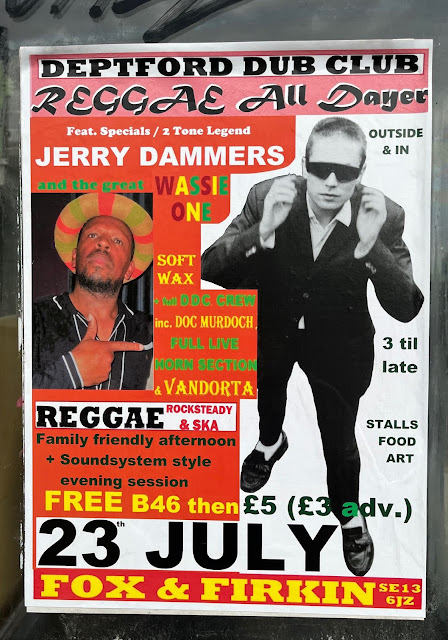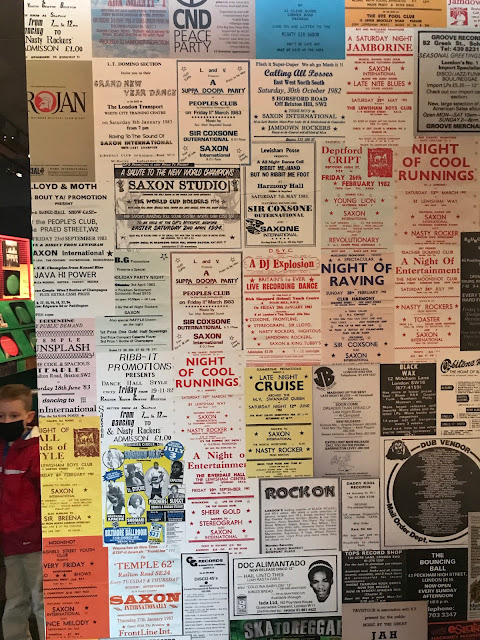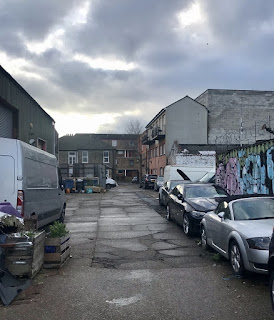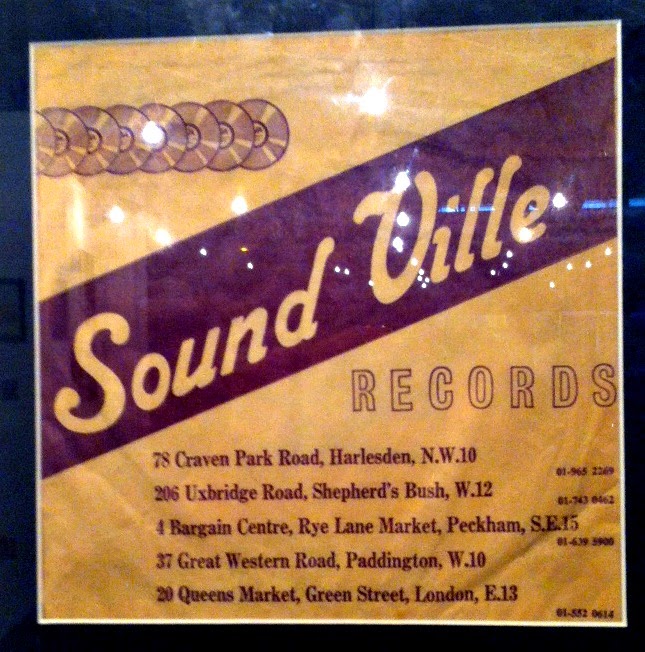Sandwiched between Surrey Canal Road SE14 (near to the Den) and Rollins Street SE15 is a run down set of buildings named the Excelsior Works. Once upon a time this place had a role in musical history as a record pressing plant from where some great records made their way around the world.
The site seems to have been farm land at the turn of the 20th century, but by the start of the First World War the Excelsior Works had been established, initially occupied by Thomas O’Brien and Company, wholesale ironmongers, and then from 1919 by M. Erdman and Son, portable house builders.
From the early 1920s Ebonestos Industries Ltd, a plastics company specialising in electrical insulators, moved on site having previously been based in Pomeroy Street SE14. A 1923 report mentions 'A serious fire... at the Ebonestos Insulators Works, Rollins-street, Deptford. A district call had to be circulated, but before the firemen had the flames under control the building was gutted' (Pall Mall Gazette, 19 July 1923). The works faced on to the Surrey Canal, linking it to the Surrey Commercial Docks, until the canal was filled and the docks closed in the 1970s.
Later in the 1920s the company seems to have started planning to diversify into another plastic product. In 1928 a share prospectus inviting investment in a new record company Gramophone Records Ltd reported that 'arrangements have been made for the manufacture and pressing of 200,000 record discs per month by Ebonestos Insulators Limited, which company has facilities at its works in London for extension of output as and when required' (Scotsman, 27 March 1928). Shortly afterwards this company merged with another company, British Homophone, under the latter's name. British Homophone had grown out of another company (Sterno) originally set up to distribute records of the Homophon Company of Berlin.
There was however a whiff of scandal about this. John Bull newspaper (12 November 1932) termed the 'Big Gramophone Combine Sensation' an 'investment swindle'. It seems that the record production capacity of Excelsior had been massively exaggerated and it was in fact 'totally unsuited for the commercial production of records'. Shareholders complained that they had been misled.
 |
| Rollins House at the back of the site on Rollins Street |
Nevertheless record production does seem to have commenced with British Homophone having its own record labels, Homochord and Sterno, putting out dance music and other popular music of the 1930s - including by Mantovani And His Tipica Orchestra. According to Discogs, it became 'one of the first companies in Britain to process and press records directly for both its own labels (Homochord and Sterno) as well as for independent labels and customers'. As 1920s/30s dance band enthusiast Michael Thomas has exhaustively documented, British Homophone put out a series of '4 in 1' records which unusually included four full length tunes on each record.
At this point, British Homophone had premises in Kilburn and Stonebridge as well as at New Cross so it may not be clear which records were manufactured where. In 1937 though British Homophone sold off the recording and commercial record label side of its business to Decca and EMI and closed down all of its premises apart from New Cross.
From this point, British Homophone seems to have only pressed records under contract on behalf of other record companies. It shared the Excelsior Works with Ebonestos: Sir Herbert Morgan was Chairman of both companies and explained in 1947 that 'the Homophone and Ebonestos companies should be regarded together in that the businesses were carried on in the same premises and, to a very large extent, under the guidance of the same personnel'. Ebenestos was said to be 'primarily concerned in the manufacture of components for the electrical, engineering, radio and motor industries' (Truth, 3 October 1947).
There was some bomb damage during the Second World War and most buildings on site are believed to date from the period after the war (or possibly the 1930s). Both companies remained on site until the 1980s, when Ebonestos moved out of London. It continues to this day as Welwyn Components Ltd, part of TT Electronics based in Bedlington, Northumberland. British Homophone is no more but as we shall see, records made there in its 1950-1980 hey day had a major cultural impact.
The Black Vinyl Atlantic
Paul Gilroy famously describes a transnational Black Atlantic culture, constituted by the circulation of black people and their cultural works between Britain, the Caribbean, the USA and Africa. Music 'comprises a central and even foundational element' of this black 'expressive culture' rooted in a common experience of the terrors of slavery and its legacies (The Black Atlantic: Modernity and Double Consciousness, 1993). In the second half of the twentieth century this culture was embodied in 7 and 12 inch circles of sound crossing the ocean in all directions - let's call it the Black Vinyl Atlantic.
Concretely, songs might be composed and recorded in Jamaica, pressed on to vinyl in England, and the records exported back to the Caribbean. Or as Lloyd Bradley describes in his excellent 'Sounds Like London. 100 Years of Black Music in the Capital' (2013) musicians from Africa and the Caribbean might travel to London to record tracks which were then distributed globally from Britain on labels like Emil E. Shalit's Melodisc. Some of these records might then have been brought back to Britain amongst the possessions of DJs, musicians and other migrants moving here. Other records that had already been released in Jamaica or the USA were licensed to be re-pressed in London.

The British Homophone factory in New Cross was one of the points on this musical and cultural network - a place where the spirit was made flesh as songs were transferred to vinyl. The Discogs detectives have perfected a science of reading the runes and serial numbers on records to work out where they were pressed, and thanks to this have been able to compile an impressive British Homophone discography. This includes some of the great artists and recordings of the Black Atlantic, in particular ska, early reggae and soul.
There are tracks on the Bluebeat label, the ska label started by Shalit, and on R&B Discs and its various subsidiary labels such as Ska Beat and National Calypso (these were run by Jewish couple Rita and Benny Isen from their shop in Stamford Hill). Tracks on Doctor Bird and Rio records, most of them recorded in Jamaica, including early releases by The Wailers and The Maytals 'Sensational Maytals' LP. And quite a few on Island Records and associated labels, including the famous 'Guns of Navarone' by The Skatalites and Bob and Earl's soul classic 'Harlem Shuffle' (on Sue Records, owned by Island's Chris Blackwell).
President Records
A new chapter for British Homophone started in 1971 when President Records executive Edward Kassner acquired a 50% stake in the company. Kassner, a refugee from Nazi Austria, had started his record company in 1955. In 1968 President Records had secured its first number one single with 'Baby Come Back' by The Equals, featuring Eddy Grant. In the 1970s, President signed Miami artists KC & The Sunshine Band and George & Gwen McCrae, releasing their records on its subsidiary soul label Jay Boy. They had massive hits including George McCrae's Rock Your Baby (number one in 1974) and KC's 'Queen of Clubs', 'Get Down Tonight' and 'That's the Way I Like It' (in 1974/5). By this point President was manufacturing its records at British Homophone, with Music Week in 1974 describing it as President's own pressing facility. So yes, it seems that these Miami disco classics, hits in the UK before the USA, were launched from New Cross.
Eddy Grant
By the end of the 1970s the British Homophone plant was in decline. It was bought in 1979 by Eddy Grant who had had a long association with President Records while with his band The Equals. Grant had opened his Coach House Recording Studio in Stamford Hill in 1974, and launched his own Ice record label. In buying the pressing plant Grant was establishing 'the first black-owned manufacturing facility in England' for records (Bradley). This was a busy time for Grant and for Ice, so presumably some of their output was pressed at Excelsior. But in the music business conditions of the time it was to prove a stretch too far. Grant recalled: 'When it became critical was with the pressing plant, because the bastards at the major companies would use my plant for their overruns – Christmas is coming or Elvis’s birthday or something. They would use my facility and wouldn’t want to pay; there was a particular time when the music business was in such terrible straits that they wouldn’t pay me. So I had on the one hand the brothers who couldn’t pay me, and on the other hand the white companies who wouldn’t pay me' (quoted in Bradley). Grant sold up and moved to Barbados in 1981 and the factory seems to have closed for good by 1985.

The records made here had an international impact, but it's also intriguing to think about records made in New Cross being played locally on sound systems and in blues parties. And in fact we do know there was a direct link between the British Homophone factory and the area's best known sound system, Saxon Studio International - launchpad for the careers of Tippa Irie, Maxi Priest, Smiley Culture and many others. Co-founder
Denis Rowe told reggae historian David Katz that his uncle worked at British Homophone 'which was off Ilderton Road in New Cross, so most people used to come to my house to get records; them days, people used to press records for Jamaica over here and American music was printed here and sent to America. So I grew up around records, and started to buy records at a young age.' Rowe's dad ran a shop in Malpas Road, Brockley where parties were held - no doubt playing some records manufactured a short distance away.
Today there are various workshops on a site that seems dominated by second hand/scrap cars. There are also artist studios, though a few years ago there was a
dispute with developers Renewal about their plans to redevelop the site - not sure of the current status of this. Maybe no music here, though elsewhere along Surrey Canal Road other former industrial spaces are being put to good use. By all accounts there have been some great club nights at Venue MOT Unit 18 on the Orion Industrial Estate, while Digital Holdings on the Juno Industrial Estate has become an important music recording studio for grime and drill artists. Perhaps they are tuning in to the echoes of British Homophone and its outernational sounds.
Neil Transpontine (2021), British Homophone and the Black Vinyl Atlantic. <http://transpont.blogspot.com/2021/01/british-homophone-and-black-vinyl.html>. Published under Creative Commons License BY-NC 4.0. You may share and adapt for non-commercial use provided that you credit the author and source.





































































